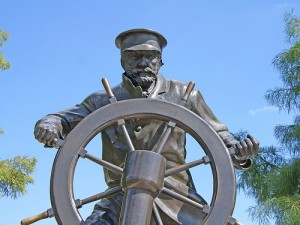You just can’t survive in the information age without a personal learning network. You may not have identified yours by that nomenclature (love that word), but I bet you have a PLN. Yours most likely includes someone younger than yourself, such as your children, grandchildren or a student. If you get stuck with a new technology term, you can certainly google it, but it helps to have someone with personal experience who can show you the ropes or tell you why you might want to give that trend (social networking, mobile app, augmented reality app, or cloud computing site) a try.
As a professional, you may also need a PLC (professional learning community) because none of us can learn in isolation any more…maybe we never could. In the past, however, the idea of entering a library and surrounding ourselves in knowledge that we might somehow attain through reading (or osmosis) was common. Today, it is much easier to admit what may have always been true- the more we learn – the more we realize what we do not know.
Tips for choosing your PLC:
1. Think about your own personal passion and try to incorporate that in your learning. I really enjoy storytelling and videoediting (digital storytelling), so machinima was a logical choice to learn. I shared an example at my Virtual Texas presentation for YALSA.
2. Remember- you can’t do everything! You can, however, do ANYTHING. Anything that you set your mind to, you can learn. All it takes is motivation and a good teacher, PLN, or PLC.
3. Be a team player. I think it is ok to be your own biggest fan (secretly hehe) but there is no need to constantly put yourself in the limelight. We learn in collaboration with others and we should acknowledge them and give them credit.
My top ALA 2011 PLC individuals:
It was difficult to decide who to see and hear, but following the blogs and tweets of these individuals helped. I know there were probably tons of great sessions that I missed, but I learned so much from these great library gurus!
First, I heard Buffy Hamilton describe her award winning library project at the Future of Libraries: Cutting-edge Services session. I could barely keep up with all the awesome ideas she shared! I have followed her on twitter, as well as on her blog, and it was super to see her in person. This dynamo was full of contagious enthusiasm. Her high school library programs won the ALA OITP cutting edge technology award.
Next, I was blown away by the Why Transliteracy panel. I’ve been following the Libraries and Transliteracy blog for some time and seeing these fabulous (and hip!) librarians, from a variety of library types, discuss the changes we are undergoing today was exactly what I hoped to hear. The four speakers didn’t tell us they had all the answers! But they are absolutely asking the right questions. The term transliteracy is fairly new and I appreciated the way it was explained. (They were even open to criticism of the word and willing to change it for a better one – if it comes along!)
And last, but definitely NOT least, I got myself up early in the morning (after roaming Bourbon Street in the French Quarter the night before- no kidding!) to hear Joe Murphy. Mobile apps and location-based communication are rapidly-expanding trends. What I liked most about Joe Murphy’s presentation was that he practiced what he preached! This was no typical slideshow. It was SO audio-visual and in real time. I was downloading the “color” app and interacting with other members of the audience, taking pictures, and trying to keep up with his presentation at the same time. He threw in quotes, music, and real life moments (Marvin Gaye lyrics that amplified the meaning of his point). Joe Murphy (@libraryfuture) is not just talking about the changes in our culture, he is immersing himself in them as an academic.
Whew! One can only intake SO much information before reaching that feeling of “overload.” I am a bit proud of myself for my wise choices this year because these speakers (all part of my personal learning community) inspired me to continue on my quest for learning the best practices of librarianship in the information age.
